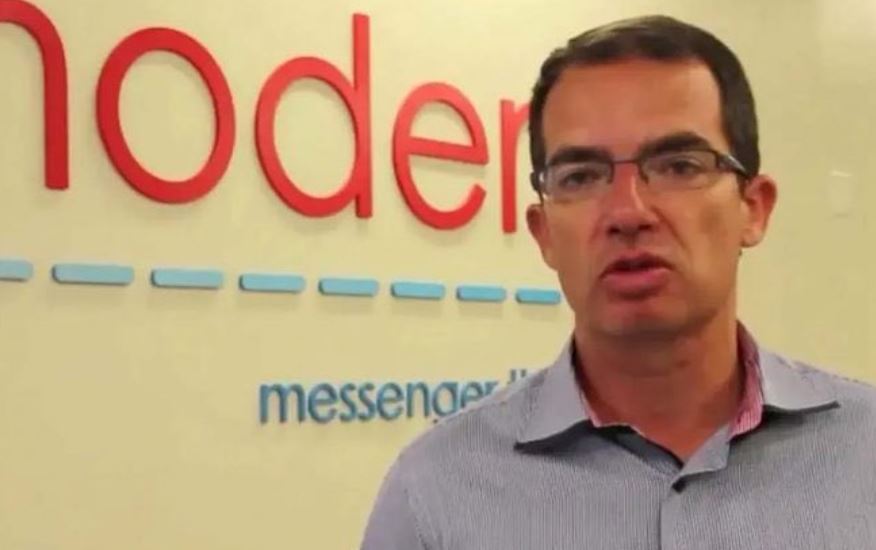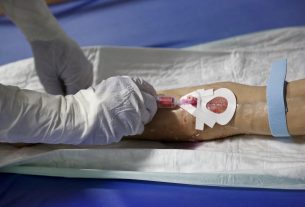The London FTSE 100 index has fallen further following concerns raised about the effectiveness of Covid vaccines against the new Omicron variant.
The CEO of pharmaceutical giant Moderna has predicted a “material drop” in the efficacy of current vaccines and warned that “all the scientists I’ve talked to [about the new variant] … are like, ‘this is not going to be good’.”
Stéphane Bancel’s comments to the Financial Times caused markets to tumble – with shares in his own company, Moderna, plummeting 7% in today’s (November 30) early trading. Bancel warned that the Omicron variant’s higher number of mutations on the spike protein (used by the virus to infect humans), and its rapid spread in South Africa may require vaccines to be modified next year to combat the mutations.
‘This is not going to be good,’ warns Moderna CEO
“There is no world, I think, where [the effectiveness of current vaccines] is the same level . . . we had with [the] Delta [variant],” said Bancel, adding: “I think it’s going to be a material drop. I just don’t know how much because we need to wait for the data. But all the scientists I’ve talked to . . . are like, ‘This is not going to be good’.”
Bancel’s remarks are, however, at odds with those of some politicians and public health experts, with the FT quoting Scott Gottlied, a director of Pfizer and former US Food and Drug Administration commissioner, who said: “There’s a reasonable degree of confidence in vaccine circles that [with] at least three doses . . . the patient is going to have fairly good protection against this variant.”
Financial markets, however, have been spooked by Moderna’s chief executive whose FT interview followed Friday’s (November 26) FTSE 100 drop – the biggest fall since June 2020 – when news of the new variant emerged.
Monday’s brief rally has been wiped out by further falls today, following Bancel’s interview which saw the FTSE 100 (November 30) post its worst monthly performance for a year – a 2.5% contraction.
The price of oil has fallen to $70 a barrel – a 3.5% drop today that compounds earlier steep losses in November that has seen the price tumble from late October’s three year high, with a fall of some $15 per barrel – amid fears the omicron variant will hit global energy demands and the travel sector.
Analyst Craig Erlam said traders are concerned “about the efficacy of the current vaccines” on the new variant and its implications “for the global economy in the coming months.”
Army deployed for ‘great British vaccination’ drive
Boris Johnson today announced another “Great British vaccination” drive promising that a “jabs army of volunteers” will be working around the country in temporary vaccination centres that will be “popping up like Christmas trees”.
The military will help with booster jabs with 400 personnel to be deployed, the PM said, promising every adult in the UK will be offered a booster jab in the next two months.
GPs and pharmacies will get £20 for every vaccine administered on Sundays and £15-per-jab Monday-to-Saturday, up from the £12.58 previously paid. A £30 premium will also be paid for any vaccinations given to housebounds.
While mask wearing in shops and on public transport in England – and new travel restrictions – have become mandatory once again (from November 30), Johnson has resisted calls for further measures to combat the new variant.
Indeed, Downing Street “slapped down” the chief executive of the UK Health Security Agency (UKHSA) Dr Jenny Harries, reports the Telegraph, for urging people to avoid unnecessary social contact in the run-up to Christmas, “unless you need to”.
A Downing Street spokesperson said changing “the overall guidance” was not necessary, adding UKSA “is an arms-length body of government” and Dr Harries “is not a government minister.”
“The public should follow the guidance as set out by the government and indeed the prime minister at the weekend,” said the spokesperson.
So far 22 cases of Omicron have been recorded in the UK – nine in Scotland and 13 in England.




